For 2018, the S-class sees a mid-cycle update that brings powertrain changes, interior and exterior design tweaks, and, most significantly, enhanced semi-autonomous driving functions.
In the new 2018 S-class, the cruise control automatically adjusts its speed for curves, intersections, changes in the speed limit, and toll plazas. (Its knowledge of the terrain is based on GPS data.) This goes a step beyond the functionality previously offered in the mid-size E-class. The net effect is that one can use cruise control—and its attendant steering-assist function—much more often on secondary roads and not just on highways.
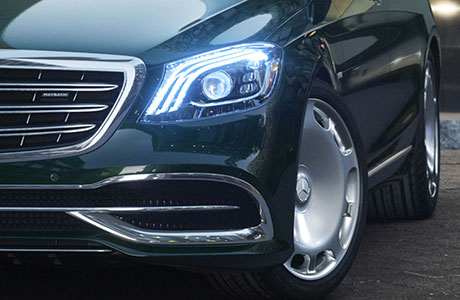
This could be the biggest development in cruise control since adaptive cruise allowed drivers to use the feature in heavy traffic, provided that drivers get comfortable with it. It is a little harder to trust than simple adaptive cruise control. With the car in its default Comfort driving mode, the cruise control will slow considerably for curves—more so than you might on your own—before quickly accelerating back to the set speed. In Sport or Sport+, however, it doesn’t slow as much and carries more momentum through corners.

That aspect works fine, but what’s somewhat disconcerting is learning to trust the car to slow on its own when approaching intersections, because the driver must be ready to brake for oncoming traffic at a yield or to brake for a stop at a stop sign.

If there’s no oncoming traffic at a yield and no braking is required, the driver can stay off the brakes and let the car do it all; if one does have to brake at a yield or for a stop, the driver afterward needs to hit the resume button to reactivate cruise control.

(The resume and other cruise-control switches have moved to the left spoke of the steering wheel; M-B’s stalk-mounted controls are no more.) In addition to slowing for curves or intersections on the current road, if the driver indicates a turn onto a side street or into a parking lot, the car again will automatically slow for it.
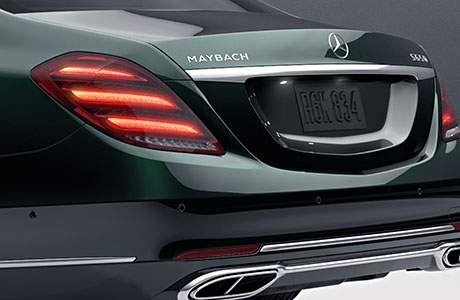
Another major enhancement over last year’s S-class is that the semi-autonomous steering now can perform a lane change. The driver activates the turn signal, and the steering assist will make the lane change, provided the adjacent lane is clear.
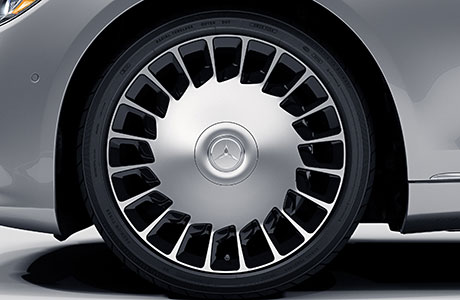
If not, the car will cancel the turn signal and wait to switch lanes. When it’s clear (within 10 seconds or so), the system will automatically reactivate the turn signal and steer into the adjacent lane; the instrument cluster indicates what’s happening. Autonomous lane changing works only on multilane roads; it will not execute a pass on a two-lane road.
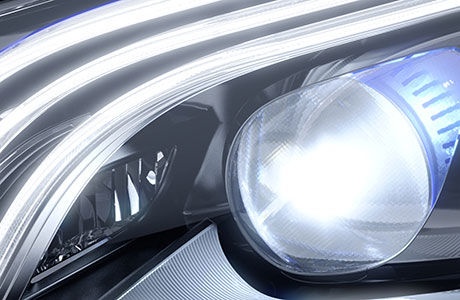
Engines of Change
Other changes to the S-class are more notable when a human is in control, with the biggest found under the hood. A new base-model S450 employs a V-6 engine making 362 horsepower from 3.0 liters and a pair of turbochargers.

The mainstay S550 becomes the S560—resurrecting a longtime S-class model number—as its twin-turbo V-8 increases in output even as it decreases in displacement. Its previous 449-hp 4.7-liter V-8 is supplanted by a 4.0-liter good for 463 horsepower and 516 lb-ft of torque.

The AMG versions retain their S63 and S65 model names. The eight-cylinder S63 downsizes its V-8 from 5.5 liters to the new 4.0-liter shared with the S560. AMG, however, manages to extract 603 horsepower and 664 lb-ft from those four liters, a gain of 26 horsepower over the old 5.5-liter engine (torque is unchanged).

The S65 retains its V-12, which evidently has plateaued at 621 horsepower and 738 lb-ft. That V-12 also appears in the S650 Maybach. Not yet for our market is a new inline-six engine with an electric supercharger along with a conventional turbo, an integrated 48-volt starter/alternator, and direct-drive accessories. (There also will be a diesel inline-six that we’ll probably never see in America.)


We drove the S560 and the S63, which arrive on our shores this fall. Despite not getting a new model designation, the S63 has more mechanical changes. In addition to the new engine, it trades its seven-speed automatic transmission for a nine-speed unit. Its standard all-wheel-drive system, 4MATIC+, offers a variable front-to-rear split. (The S560 retains the fixed, rear-biased 4MATIC system, but it’s optional.)
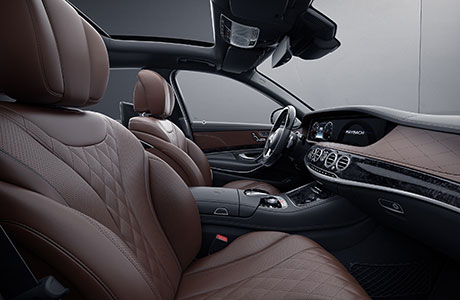
Trundling through town, the S63’s new transmission never betrays its lack of a torque converter. The nine-speed, which is coupled to the engine with a clutch pack, is smooth and well mannered. Pull out to pass in the S63, and it’s like getting punted from behind.


The gearbox instantaneously drops a few gears, and the engine’s forceful wave of torque rockets you ahead. In Sport and Sport+ modes, the driver doesn’t have to dig as deeply into the accelerator travel to get a downshift or two, which seems about right. So, too, is the measured, progressive throttle response, never mind that this is a relatively small engine making big power thanks to two turbos.
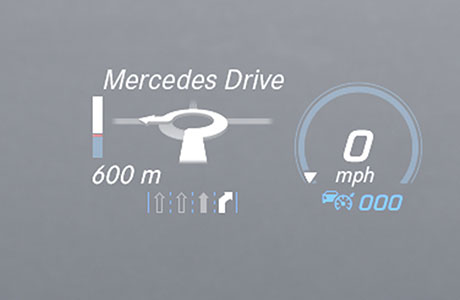
The S560 uses a nine-speed automatic, too, but this one has a conventional torque converter. Its downshifts in response to a mashed accelerator are just fractionally less immediate than the S63’s, and the resulting rush of acceleration is considerably less frenetic.
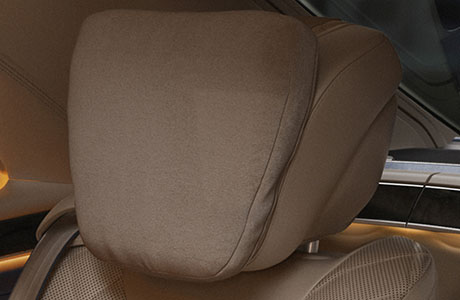
Mercedes puts the S560’s zero-to-60-mph time at 4.5 seconds and the S63’s at 3.4. When it comes time to scrub off speed, the big brakes are easy to modulate. Should you fail to use them, the automated emergency braking system now can avoid a collision—with another car or a pedestrian—at higher speeds, and if the driver attempts to swerve around an obstacle, the steering can assist an evasive maneuver.
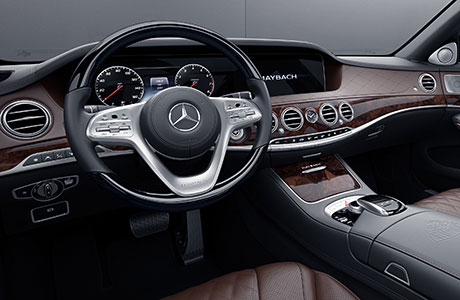
Aside from the option of a “curve-tilting function” on the S560 (the Magic Body Control active suspension adjusts to lean into corners; it’s available with rear-drive only), there’s not much new in the way the big Benz rides and handles. Both variants have nicely sorted driving modes, without jarring steps from one to the other (Comfort, Sport, Sport+, and Individual in the S63; the S560 trades Sport+ for Eco mode).
The creamy yet precise steering isn’t overboosted even at low speeds in Comfort, and it seamlessly builds effort if you toggle to a sportier setting. Similarly, the chassis that is compliant in Comfort firms up somewhat in Sport but doesn’t get flinty even in the S63’s Sport+. This is a big, heavy car, however, and even in the AMG in its firmest setting, one is keenly aware of that mass when diving into tight corners. The S-class is supremely capable—particularly the S63—but you wouldn’t call it playful.
Screen Gems
If it’s amusement you’re looking for, you might find it in the wonderland that is the Benz’s widescreen digital dashboard display. The previous pair of 12.3-inch TFT screens are now housed together to appear as a single unit. The center screen’s functions are navigated via the familiar COMAND console-mounted wheel and touchpad or via a tiny touch-sensitive nub on the right spoke of the steering wheel.
You swipe across it or up or down with your thumb, then press it to select—which sounds fussy but actually is pretty easy to use. A similar nub on the left side controls what is displayed in the virtual gauge cluster, which can be set up in three different formats: Sporty, Classic, and Progressive.
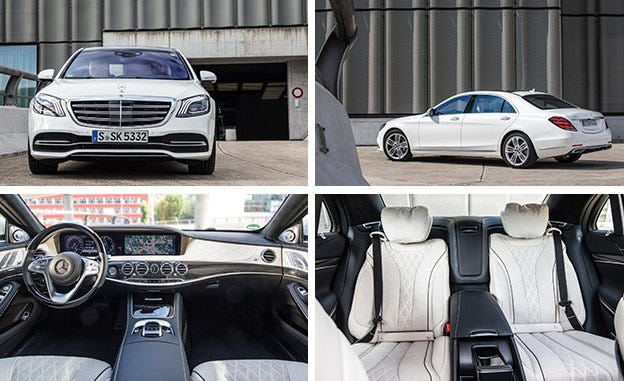
Some new discoveries: The S63 has a Track Pace menu in the center screen that can record lap times; a Drag Race page can measure acceleration, quarter-mile times, and braking distances. For just such occasions, Mercedes has made the S63’s Race Start function easier to access: Mash the brake pedal with your left foot while flooring the accelerator with your right; use the shift paddles to increase or decrease the engine revs before releasing the brake.

An Energizing Comfort menu purports to create an interior ambiance via audio, lighting, seat massaging, and fragrance. The choices are Refresh, Vitality, Joy, Well Being, and Training. Our drive partner at the media event vetoed Joy, so we tried Well Being.
But that fired up the seat heaters—not ideal on a summer day—and the fragrance was overpowering. We switched to Vitality but hated the music (the system also can pull from your own music collection, provided the beats per minute are appropriate). We completed the rest of our drive without the benefit of Energizing Comfort.
Cast a glance away from the screens and the cabin is largely the same, rich environment we know now, with the main changes being a switch to a three-spoke steering wheel (in the S63 it gets a squared-off rim wrapped in leather and microsuede) and a new standard inductive charging pad on the center console (and an optional second one in the rear).
Both the S560 and S63 we drove were dressed up with nappa leather interiors from Benz’s Exclusive collection, featuring a two-tone color scheme, perforated leather in a diamond pattern, and carbon-fiber trim with brushed-metal accents.
No Greyhound ever looked like this inside.
Nor was it as comfortable—even without a snoring vagrant in the next seat. But the 2018 S-class does take another step down the path of turning drivers into passengers. It’s just doing so at the far opposite end of the socioeconomic scale.





















No comments